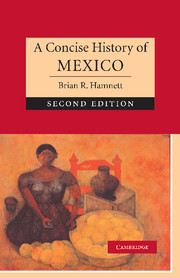Book contents
- Frontmatter
- Contents
- List of illustrations
- Chronology
- Preface to the second edition
- Preface to the first edition
- 1 Mexico in perspective
- 2 The pre-Columbian era
- 3 The European incursion, 1519–1620
- 4 New Spain, 1620–1770: Spanish colonialism and American society
- 5 Destabilisation and fragmentation, 1770–1867
- 6 Reconstruction, 1867–1940
- 7 The monopoly party, 1940–2000
- 8 The Fox administration, 2000–2006
- 9 Cultural developments since Independence
- Final comments
- Bibliography
- Index
- Titles in the series
9 - Cultural developments since Independence
Published online by Cambridge University Press: 05 June 2014
- Frontmatter
- Contents
- List of illustrations
- Chronology
- Preface to the second edition
- Preface to the first edition
- 1 Mexico in perspective
- 2 The pre-Columbian era
- 3 The European incursion, 1519–1620
- 4 New Spain, 1620–1770: Spanish colonialism and American society
- 5 Destabilisation and fragmentation, 1770–1867
- 6 Reconstruction, 1867–1940
- 7 The monopoly party, 1940–2000
- 8 The Fox administration, 2000–2006
- 9 Cultural developments since Independence
- Final comments
- Bibliography
- Index
- Titles in the series
Summary
A rich Mexican historiographical tradition with roots in the colonial period preceded the development of a distinct fictional tradition. In spite of discrepancies in timing and quality, both grew in relation to the dawning of a national consciousness during the course of the nineteenth century. At the same time, each drew on external influences as well as native roots. Mexican historiography really came into its own with the attempt to ascertain the origins, nature and implications of the struggle for independence from Spain. Carlos María Bustamante (1774–1848), Cuadro histórico de la revolución de la América mexicana (1821–27; second edition 1843–46), saw the overthrow of Spanish rule as the reversal of the Conquest. Bustamante had participated in the War of Independence with Morelos and played an active role in politics after 1821. Lucas Alamán, Historia de México (5 vols., 1846–52), adopted a different perspective. Alamán posed the problem of the relationship between the new sovereign state, beset by internal division and external threat, and the Spanish colonial tradition. In his view, Mexico's character derived from its Hispanic and Catholic identity. Alamán's political and historical ideas fused in his lesser known, Disertaciones sobre la historia mexicana (1844–46). Commentators in the Liberal tradition, such as José María Luis Mora (1794–1850), looked to the European constitutional liberalism as the model for a nineteenth-century state. Later Liberals drew their inspiration from the American and French Revolutions.
- Type
- Chapter
- Information
- A Concise History of Mexico , pp. 310 - 340Publisher: Cambridge University PressPrint publication year: 2006



